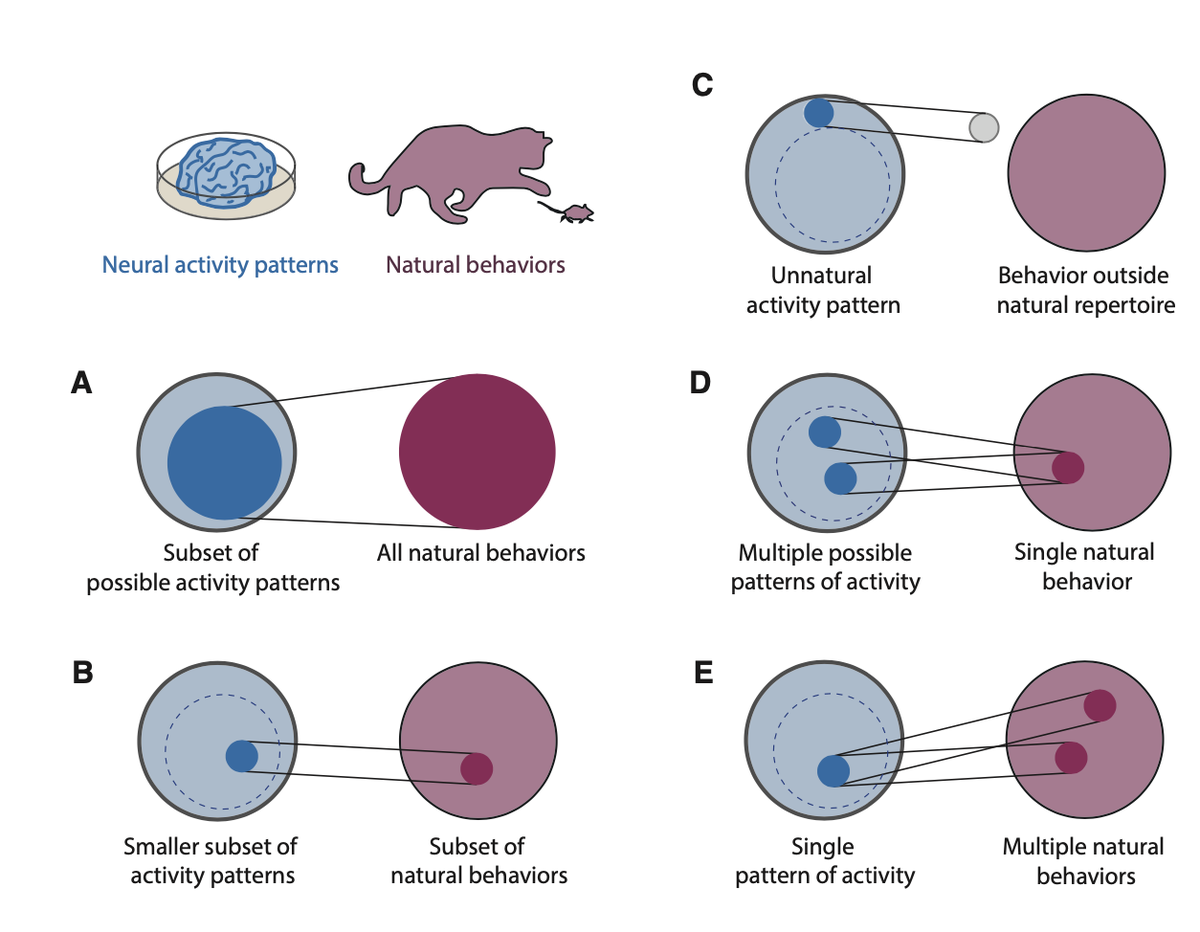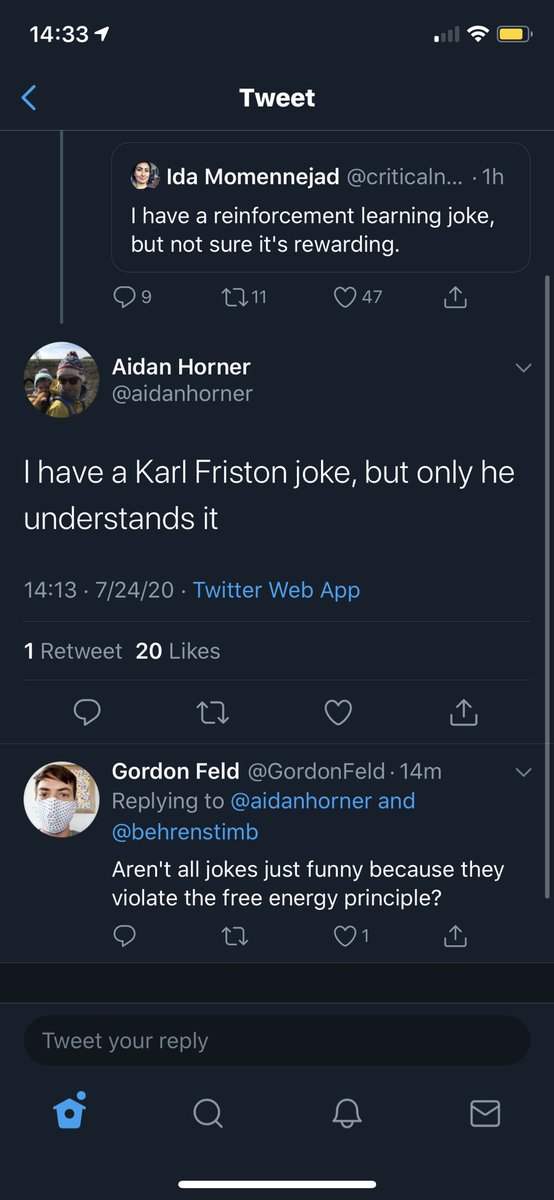So it’s Causality day at @neuromatch - a day many of us have been looking forward to - and between the tutorials and Q&A I thought a  might be good
might be good
1/15
 might be good
might be good 1/15
Q & A kicked off by echoing Neurostars “what is causal modelling” and “does it even exist”
Neuro got its start from leisoning studies, and causality is the “gold standard” in many ways - so why aren’t more neuro people in it (skip to the end for tea?)
2/15
Neuro got its start from leisoning studies, and causality is the “gold standard” in many ways - so why aren’t more neuro people in it (skip to the end for tea?)
2/15
Tutorials were pointing out the different ways that causal models fail
1. perturbations : we can introduce them to elicit out cause, but it’s still noisy and pretty crap when we increase the size of our system (ie. more than a handful of neurons)
3/15
1. perturbations : we can introduce them to elicit out cause, but it’s still noisy and pretty crap when we increase the size of our system (ie. more than a handful of neurons)
3/15
2. correlations : correlation is NOT causation (are we really still on this y’all - double disassociate your fMRI studies y’all)
3. simultaneous fitting/regression : if you are asking a causal system, you need all the variables…you just..can’t..it’s not..why...just..don’t
4/15
3. simultaneous fitting/regression : if you are asking a causal system, you need all the variables…you just..can’t..it’s not..why...just..don’t
4/15
Also - remember clean model creation - if you’re going for a logistic regression then set it up with training, test, and crossvalidation sets. #datasciencehygiene
5/15
5/15
1. instrumental variables : NOW we get interesting. Find how much of your tx can be affected by the IV, and then how much the outcome shifts in response. Pick these carefully. Pick these well. Ideally, plan your study BEFORE you do it.
6/15
6/15
So why don’t we try it more?
“You can only find out if you’re wrong if you actually measure something” (very man in the arena, @KordingLab)
7/15
“You can only find out if you’re wrong if you actually measure something” (very man in the arena, @KordingLab)
7/15
So what do we do?
My 2
"Perhaps 'causality' is a human's/society's best model of the world" - @chiral_M
Yeah, I’m banking a career on it.
8/15
My 2

"Perhaps 'causality' is a human's/society's best model of the world" - @chiral_M
Yeah, I’m banking a career on it.
8/15
My argument for “why do we need causality” has two points
1. Our brains do not exist on slices and we need to understand cause
2. Science does not exist in a high walled garden
9/15
1. Our brains do not exist on slices and we need to understand cause
2. Science does not exist in a high walled garden
9/15
To the first: no invitro is an island
Nature’s “brains need behaviour” was shocking enough so I’m turning off my DM’s for this. 10/15
Nature’s “brains need behaviour” was shocking enough so I’m turning off my DM’s for this. 10/15
Action has cause. Just as Krakauer argued that abstracting bayesian representations of systems is erroneous without the cognitive/psychology, just as Poeppel argues for non-reductionist neuroscience - we exist in interaction. 11/15
The second - is causality about intervention?
Scientists have long since lofted themselves above society. Areas of interest so far removed from day to day goings on. This is not to say that thermal tolerances of CaMK2 is not a worthy pursuit (it is)- but it loses its why.
12/15
Scientists have long since lofted themselves above society. Areas of interest so far removed from day to day goings on. This is not to say that thermal tolerances of CaMK2 is not a worthy pursuit (it is)- but it loses its why.
12/15
Science, neuroscience, needs a flow into the real world, and to investigate the applications of what we find in labs - we need causal inference studies (Yeah, you can @ me now) to assess efficacy of interventions - to inform policy.
To do more than sit in arm chairs.
13/15
To do more than sit in arm chairs.
13/15
There is a moral imperative - if not a written one - to create a better world
this cannot be done if phds dust shelves (both referring to the research and to the people) 14/15
this cannot be done if phds dust shelves (both referring to the research and to the people) 14/15
causality is needed in order to develop interventions, to assess them, and then to write into policy what may be done (eg. taxes and smoking that we all went through modeling today) and economists are almost as bad as physicists (@ you) - we need to do better. /end
A few more from the live commentary
- On dynamic causal modeling @aidanhorner hit it out of the park.
KK: DCM has causal components, but it doesn’t tell you causality. It tells you what model best fits your data (it’s a tool we can use, not causal inference)
- On dynamic causal modeling @aidanhorner hit it out of the park.
KK: DCM has causal components, but it doesn’t tell you causality. It tells you what model best fits your data (it’s a tool we can use, not causal inference)

 Read on Twitter
Read on Twitter



